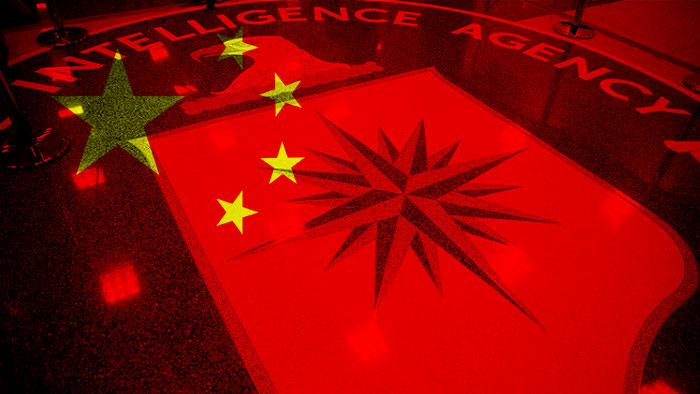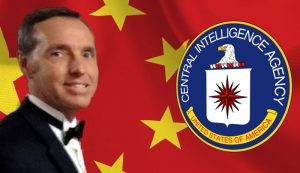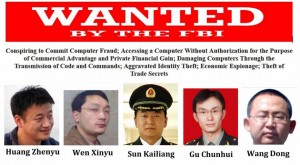If you just read this affidavit, a naturalized US citizen who was a case officer for the CIA from 1994 to 2007 retained classified information in his home. Just like Clinton, former CIA Directors Deutch and Petraeus, Harold Martin and others did. However, news sources are saying he may have given his info to the PRC who then rolled up 20 CIA assets in that country. Rolled up meaning shot, killed. Stay tuned to this new case; updates at the bottom of the page:
(DOJ; 16 Jan 2018) Jerry Chun Shing Lee, aka Zhen Cheng Li, 53, a former Central Intelligence Agency (CIA) officer, was arrested last night on charges of unlawful retention of national defense information.
Dana J. Boente, Acting Assistant Attorney General for National Security and U.S. Attorney for the Eastern District of Virginia, and Andrew W. Vale, Assistant Director in Charge of the FBI’s Washington Field Office, made the announcement.
Lee was arrested after arriving at John F. Kennedy International Airport in Queens, New York. Lee is a naturalized U.S. citizen, currently residing in Hong Kong, China.
According to court documents, Lee began working for the CIA as a case officer in 1994, maintained a Top Secret clearance and signed numerous non-disclosure agreements during his tenure at CIA.
According to court documents, in August 2012, Lee and his family left Hong Kong to return to the United States to live in northern Virginia. While traveling back to the United States, Lee and his family had hotel stays in Hawaii and Virginia. During each of the hotel stays, FBI agents conducted court-authorized searches of Lee’s room and luggage, and found that Lee was in unauthorized possession of materials relating to the national defense.
Specifically, agents found two small books containing handwritten notes that contained classified information, including but not limited to, true names and phone numbers of assets and covert CIA employees, operational notes from asset meetings, operational meeting locations and locations of covert facilities.
Lee made his initial appearance this afternoon in the Eastern District of New York.
He is charged with unlawful retention of national defense information and faces a maximum penalty of 10 years in prison, if convicted. The maximum statutory sentence is prescribed by Congress and is provided here for informational purposes. If convicted of any offense, the sentencing of the defendant will be determined by the court after considering the advisory Sentencing Guidelines and other statutory factors. A criminal complaint contains allegations that a defendant has committed a crime. Every defendant is presumed to be innocent until and unless proven guilty in court.
Assistant U.S. Attorney Neil Hammerstrom of the Eastern District of Virginia and Deputy Chief Elizabeth Cannon of the National Security Division’s Counterintelligence and Export Control Section are prosecuting the case.
Download Lee Complaint Affidavit (pdf)
Arrest Warrant (pdf)
Overview:
- Jerry Chun Shing Lee
- 53 years old (born 1964), Zhen Cheng Li
- Naturalized US citizen
- Served in US Army, 1982-1986
- Graduated from Hawaii Pacific University: BA in Business Management (1992), MA in Human Resources Management (1993)
- 1994: 30 years old, joins CIA, becomes a Case Officer (recruits spies) in East Asia Division
- Held TS/SCI clearance
- 1999-2002: Posted to Tokyo
- Left the CIA in 2007
- Became employee of Christie’s Hong Kong; focused on physical security for Christie’s facilities and staff
- 2010-2012: Around 20 CIA assets in PRC are arrested, shot
- 2011: FBI starts a CI investigation on who or what compromised the assets; focuses on suspected mole Jerry Chun Shing Lee; finds his two small books with classified info from his work at CIA. FBI watches as he keeps these books over the years.
- 2018: Finally arrests Lee because of the books
From the affidavit:
. . . . The datebook contained handwritten information pertaining to, but not limited to, operational notes from asset meetings, operational meeting locations, operational phone numbers, true names of assets, and covert facilities.
The address book contained approximately twenty-one pages. The address book contained true names and phone numbers of assets and covert CIA employees, as well as the addresses of CIA facilities.
The CIA classification authority determined that the books contained classified information. . . .
. . . . Classified cables that LEE wrote when he was a case officer, which describe his interactions with assets and information he learned from those meetings, and for which he was the derivative classification authority, contain much of he information reflected in the books. . .
–
Ex-CIA officer Jerry Chun Shing Lee suspected of spying for China (NBC News)
. . . But sources familiar with the case say he is suspected of funneling information to China that caused the deaths or imprisonment of approximately 20 American agents, in one of the worst intelligence breaches in decades.
The New York Times reported last year that the Chinese government systematically dismantled CIA spying operations in the country starting in 2010, killing or imprisoning more than a dozen sources over two years and crippling intelligence gathering there for years afterward.
CIA and FBI officials were mystified and mortified as one after another of their best agents in China were jailed or executed.
It was considered the worst intelligence catastrophe since the 1990s, when Aldrich Ames and Robert Hanssen, formerly of the CIA and the FBI, provided secrets to Moscow for years that led to the deaths of multiple agents. Both men are serving life terms in federal prison.
The Times story described a debate over a suspected mole, a former CIA case officer now living in an Asian country.
An FBI task force launched an investigation and began to focus on Lee, sources tell NBC News. It’s unclear how the FBI lured Lee back to the U.S. but officials say there have been several undercover attempts to incriminate him, and at least one confrontational interview during which he denied being a spy.
In 2012, one source said, the FBI lured Lee back to the U.S. with a phony job offer, but no charges were filed and he returned to Hong Kong.
Officials familiar with the case say it is unlikely that Lee will be charged with espionage, which can carry the death penalty. It may be that the government doesn’t have the proof required for such a charge, or that it doesn’t want to air secrets in an open courtroom. . . . (read more)
Ex-C.I.A. Officer Suspected of Compromising Chinese Informants Is Arrested (New York Times)
A former C.I.A. officer suspected of helping China identify the agency’s informants in that country has been arrested, the Justice Department said on Tuesday. Many of the informants were killed in a systematic dismantling of the C.I.A.’s spy network in China starting in 2010 that was one of the American government’s worst intelligence failures in recent years, several former intelligence officials have said.
The arrest of the former agent, Jerry Chun Shing Lee, 53, capped an intense F.B.I. investigation that began around 2012 after the C.I.A. began losing its informants in China. Mr. Lee was at the center of a mole hunt in which some intelligence officials believed that he had betrayed the United States but others thought that the Chinese government had hacked the C.I.A.’s covert communications used to talk to foreign sources of information.
Still other former intelligence officials have also argued that the spy network might have been crippled by a combination of both, as well as sloppy tradecraft by agency officers in China. The counterintelligence investigation into how the Chinese managed to hunt down American agents was a source of friction between the C.I.A. and F.B.I. . . . (read more)
RELATED: Killing C.I.A. Informants, China Crippled U.S. Spying Operations (New York Times, 20 May 2017)
FBI: ex-handler of covert ‘assets’ traveled with lists of foreigners working for U.S. (Politico)
. . . . Wilder said investigators clearly suspected Lee of espionage but might not have the proof to bring such a charge.
“That is the kind of thing that a covert officer would only collect in that way, to sell to somebody,” he said. “But the fact that they did not arrest him on espionage charges means that they did not have direct evidence of espionage with a foreign power. It doesn’t mean he wasn’t involved in that. But those cases are very hard to make. You need to have a very high standard [of evidence] to charge that. You need to demonstrate contact with a foreign power, the passing of information, you have to have proof that he took this information and that he gave it to somebody else.”
O’Brien’s affidavit suggests that the FBI waited at least eight months after the searches before interviewing Lee in May and June of 2013. He apparently then returned to Hong Kong. It’s unclear whether he has been in and out of the U.S. between 2013 and his arrest on Monday night.
Wilder said the delay in arresting Lee suggested that the FBI was trying to put together more evidence but ultimately couldn’t.
“They obviously sensed that he was doing wrong,” Wilder said. “Waiting until 2018 to arrest him, I imagine that they were hoping to build a strong espionage case against him. … If the information he had was provided to a foreign power, it would be very damning, whether it was connected to Beijing or not.”. . . (read more)
A Christie’s Security Staffer Has Been Accused of Being a Deadly Chinese Spy (ArtNet News)
A former CIA officer suspected of revealing classified information to China has an unlikely day job: He is an employee of Christie’s Hong Kong. A Christie’s spokesperson confirmed to artnet News that the auction house has “suspended a Hong Kong employee pending a criminal investigation.”
A statement from the US Department of Justice identifies the former CIA officer as Jerry Chun Shing Lee (aka Zheng Cheng Li). He was arrested at John F. Kennedy Airport in New York on January 15 and has been charged with the unlawful retention of classified information. He faces a maximum of 10 years in jail if convicted.
A Christie’s spokesperson told artnet News via email:
• This employee, who has been with the company for the last 20 months, was focused on physical security for Christie’s facilities and staff. His role was not linked to data security or IT functions at the company.
• The allegations significantly pre-date his employment with the company.
• Christie’s has no involvement in this matter, and has no additional comment on the ongoing investigation.
A Hong Kong website posted pictures of a man it identifies as Lee standing in a Christie’s salesroom with an earpiece in his ear. Christie’s confirmed that Lee leads a small team focused on physical security for the auction house’s facilities and staff. . . . (read more)
The Specter of a Chinese Mole in America (The Atlantic)
The arrest of former CIA case officer Jerry Chun Shing Lee sheds light on a shadowy counterintelligence drama that has been playing out for nearly eight years. Starting around 2010, the Central Intelligence Agency saw some of its most valuable spies inside China go down. And I don’t mean “going down” in a perp-walk-to-the-courthouse sort of way. This is China: They were executed. One was reportedly shot right outside the government building where he worked, just to make sure his coworkers got the message. The lucky ones were imprisoned. According to The New York Times, 18 to 20 CIA sources were blown, making it one of the most damaging counterintelligence losses in agency history.
The story of Lee’s arrest is still developing, but much is already clear. First of all, Jerry Chun Shing Lee wasn’t some back-room paper-pushing bureaucrat at Langley. He was a “case officer” whose job was helping to recruit foreign spies to spill secrets to the United States. He was supposed to create moles, not become one.
It also appears the Chinese government probably gained access to highly classified information about U.S. assets through electronic means, a mole, or both. According to press reports, intelligence officials have been sharply divided about how exactly all of this valuable intelligence got into Beijing’s hands. News of Lee’s arrest suggests that a mole was involved but certainly does not rule out other possibilities or people.
The FBI has not yet run this case to ground. . . . (read more)
Hunting a C.I.A. Mole, Agents Gambled and Let a Suspect Return to China (New York Times, 17 Jan 18)
Face to face with a former C.I.A. officer in 2013, federal agents took a calculated risk. They did not confront him about the classified information they had found in his luggage. And they did not ask what they most wanted to know: whether he was a spy for China.
It was a life-or-death call. The Chinese government had been systematically picking off American spies in China, dismantling a network that had taken the C.I.A. years to build. A mole hunt was underway, and the former officer, Jerry Chun Shing Lee, was the prime suspect.
The F.B.I. could have arrested him on the spot for possessing classified information. But inside a secretive government task force, investigators argued against it, former American officials recalled. If Mr. Lee was a turncoat, arresting him on an unrelated charge would tip off the Chinese and allow them to cover their tracks. If he was not the mole — and some argued strenuously that he was not — an arrest might allow the real traitor to escape.
So the F.B.I. allowed Mr. Lee to return to Hong Kong, court papers show, where he hastily resettled with his family. The agents, working out of an office in Northern Virginia, gambled that by watching patiently, they might piece together how China had decimated the United States’ spy network, and determine whether Mr. Lee had helped.
Nearly five years later, when Mr. Lee made a surprise return to the United States this week, the F.B.I. made its move. He stepped off a Cathay Pacific flight at Kennedy International Airport on Monday and was waved through customs. A waiting F.B.I. agent, Kellie O’Brien, called out his name, according to court records. Mr. Lee answered, and was arrested.
His apprehension, on the same single charge that could have been brought years ago, is the latest development in one of the most damaging affairs in modern C.I.A. history. But it does nothing to settle the question of how or whether Mr. Lee was involved. For years, he was the prime suspect in a mole hunt, but officials disagreed over whether he was actually to blame. . .
. . . Some former officials who reviewed the evidence described the case against Mr. Lee as strong but circumstantial, not bulletproof. Some at the C.I.A. argued that officials were too quick to suspect a mole — especially a Chinese-American — when there were other explanations. . . (read more)
Time gap suggests FBI tried questioning espionage suspect before arrest (Politico)
. . . Lee has also come under suspicion in a broader investigation of how China killed or arrested about two dozen individuals who served as CIA sources, according to former officials. He has not been charged with espionage or with disclosing classified information to anyone.
A current U.S. intelligence official acknowledged that there is more to the case than the single charge against Lee, in light of the disruption of the U.S. spying network in China.
“Given the broader questions about China and the alleged network of spies, one charge of possessing classified information doesn’t fully answer the scope of what was alleged to have happened,” said the official, who spoke on the condition of anonymity because he was not authorized to discuss ongoing cases.
O’Brien’s new affidavit refers to an “underlying investigation” but doesn’t elaborate on its focus. She does indicate that she “previously interviewed the defendant.” She doesn’t say when, but the criminal complaint says the FBI questioned Lee at least five times in 2013.
O’Brien appears to be a key agent for the FBI on China-related counterintelligence matters. She’s assigned to the Washington Field Office and was also deeply involved in a case filed last year against Candace Claiborne, a veteran State Department employee charged with making false statements and obstruction of an official proceeding for her alleged efforts to cover up payments she and an associate took from Chinese agents in exchange for information about activities at the U.S. Embassy in Beijing. . . (read more)
Spy suspect’s arrest: What motivates turncoats? (Christian Science Monitor)
The FBI has charged Jerry Chun Shing Lee, a former CIA officer, with passing secrets that helped Beijing brutally dismantle US espionage operations in China. Along with raising questions about why Mr. Lee would betray America, the arrest also points to the growing Chinese intelligence threat. . . . (read more)
Ex-CIA agent’s arrest means the U.S. has been ‘blind in China’ for years, says former spy (CBC Radio)
. . . .As far as you know, what is this former CIA officer suspected of doing?
The indictment talks about mishandling classified information. That’s a rather minor charge, but the fact that they brought it, and so publicly, means that they suspect espionage, and what this man did was take information from the CIA about agents in China. Those are sources that report to the CIA.
They clearly believe that he took those names and their identifying date and gave it to Chinese intelligence, even though that’s not in the indictment.
Do you have any idea how many informants or agents … that he [allegedly] exposed?
Well, 20 would have been pretty much the entire inventory of CIA assets inside China.
It’s hard to recruit Chinese. It takes years and years. It takes people who speak Mandarin and so on. And China is a police state, it’s very difficult to run sources there. So, you know, trying to rebuild this will take decades. This is a total catastrophe for the CIA.
Harmful to the CIA, but harmful especially for those who have disappeared into a prison or who have been killed.
They’re probably going to all end up dead if, in fact, they were spying for the CIA. The Chinese do not look at this kindly. They run a tough intelligence service and these people are not going to fare well. . . . (read more)
Photos emerge of arrested ex-CIA agent suspended from security job at Christie’s Hong Kong (South China Morning Post)
Spies fear former CIA officer may not face justice for suspected role in exposure of sources in China (Washington Post, 17 Jan 18)
. . . . The probe began in late 2011 when a worried FBI informant in China told his American handlers that everyone he knew who was helping the U.S. government was being discovered by the Chinese authorities and then being made to work for them, said a former U.S. official with knowledge of the events.
“He was nervous,” said the former official, and feared there must be a mole identifying U.S. assets, some of whom the informant knew. “He was worried about getting caught. That’s how the case got started.” . . .
. . . In 2013, the FBI approached Lee and interviewed him on five separate occasions, according to an affidavit from an FBI agent. But each time, he denied the existence of the notebooks. He was never charged with a crime and eventually left the United States for Hong Kong, where he had been living ever since. Lee was arrested Monday after he landed at a New York airport.
The major investigative work of the case was wrapped up by early 2014, the former official said.
Two former U.S. officials described Lee as an “arrogant” case officer and said he may have determined that having been interviewed multiple times by the FBI without being charged, there was little risk of his being apprehended if he returned to the United States.
For all the suspicion and scrutiny Lee has drawn, officials with knowledge of his case said it is unlikely that he will be charged with more serious offenses, such as divulging classified information to the Chinese. There is no evidence, as yet, that Lee actually gave classified information to a foreign government.
“Absent any proof, there’s not much you can do with it,” one former official said. “There’s lots of smoke around this guy. They couldn’t prove anything.”
The former official said he thought that Lee could point to the case of former CIA director David H. Petraeus, who pleaded guilty to a misdemeanor charge of mishandling information for sharing notes containing classified material with his mistress when he was commander of the NATO mission in Afghanistan.
“ ‘Why does he get a pass and you guys are worried about two notebooks of mine?’ If I were him, that would be my argument,” the former official said. . . . (read more)











